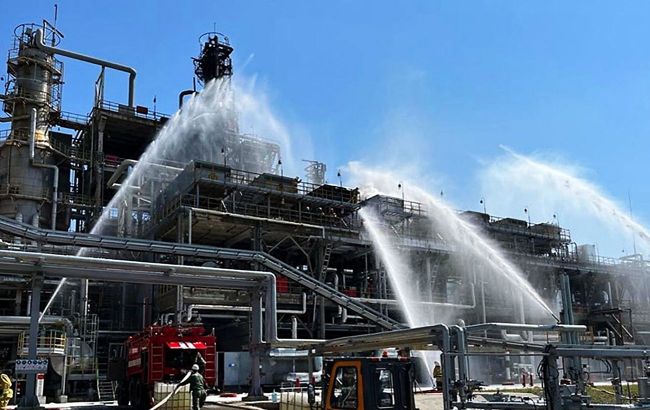Russia won’t restore oil refining before mid-2026 after Ukrainian strikes — IEA
 Photo: Ukrainian drone strikes paralyze oil refining in Russia (Getty Images)
Photo: Ukrainian drone strikes paralyze oil refining in Russia (Getty Images)
Ukrainian drone strikes on oil refineries will hamper oil processing in Russia until at least mid-2026. The attacks are causing Moscow to lose revenue and forcing it to restrict fuel exports, according to the International Energy Agency (IEA).
Kyiv has intensified its attacks on Russia's energy infrastructure, including oil refineries, pipelines, and marine terminals. These strikes aim to reduce the Kremlin's revenues and limit its ability to supply fuel to the front lines.
Since the beginning of August, Ukraine has launched at least 28 strikes on key Russian refineries. This has led to gasoline shortages in several regions, including occupied Crimea, and forced Moscow to impose restrictions on fuel exports until the end of the year.
IEA downgrades its forecast for recovery of refining
The agency says it previously assumed that refining would normalize by the end of the year, but it is now taking a more cautious view. The IEA estimates that oil refining in Russia will be less than 5 million barrels per day until June 2026.
Later, it may grow to 5.4 million barrels per day, but the forecast will be refined as new data becomes available. The increasingly large-scale campaign by Ukrainian drones against Russian refineries and infrastructure has already reduced refining by about 500,000 barrels per day, analysts said.
Russia conceals data on oil industry
According to Bloomberg, the Russian government has classified most of its energy statistics, including oil refining volumes and fuel production. This makes it difficult to assess the damage caused by drone strikes.
Deputy Prime Minister Alexander Novak recently stated that oil refining in the country is allegedly growing and covering domestic demand. However, independent assessments show the opposite: part of the capacity is idle due to damage.
Russia's oil revenues continue to fall
Against the backdrop of reduced refining, Moscow increased crude oil exports to 5.1 million barrels per day in September, the highest level since May 2023. However, oil export revenues fell to $13.4 billion, a three-month low.
According to the IEA, exports of petroleum products fell to 2.4 million barrels per day, the lowest level in a decade, excluding the 2020 pandemic period.
The decline in oil revenues is complicating Russia's budget, which continues to actively finance its fourth year of war against Ukraine. The government expects revenues from the oil and gas sector in 2025 to be the lowest since the start of the pandemic.
In August-October, Ukraine sharply increased long-range strikes on Russian refineries, depriving the Kremlin of a significant amount of oil processing capacity.
Ukrainian drone strikes forced Moscow to sharply increase exports of cheap crude oil instead of petroleum products.

